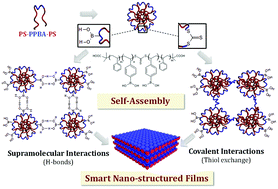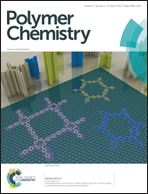Stimuli responsive nanostructured porous network from triblock copolymer self-assemblies†
Abstract
An ABA triblock amphiphilic copolymer is synthesized using RAFT chemistry. The self-assembled micelles of this copolymer are then used to prepare nano-organized porous films that could be used as filtration membranes. In this work a novel strategy is developed to build the nanostructures and perform their self-assembly using reversible and non-covalent interactions to create free volume between the micelles, thus giving tuneable porosity to the film. The self-assembly of poly(styrene)-b-poly(phenylboronic acid)-b-poly(styrene) block copolymer, occurs at high concentration through solvent evaporation, which induces a progressive decrease of the inter-micellar distance, and results in the formation of an in situ network of micelles and the final porous film. Subsequent permeability tests were conducted under different stimuli (pH and UV), generating cross-linking and chemical exchange reactions, to ensure the best balance between permeability and mechanical strength. This work highlights an original strategy for pore size control, and provides new insights towards the design of stimuli-responsive materials.


 Please wait while we load your content...
Please wait while we load your content...